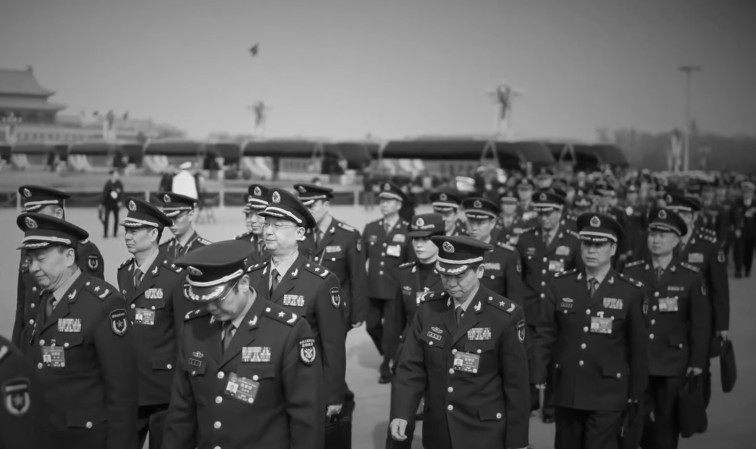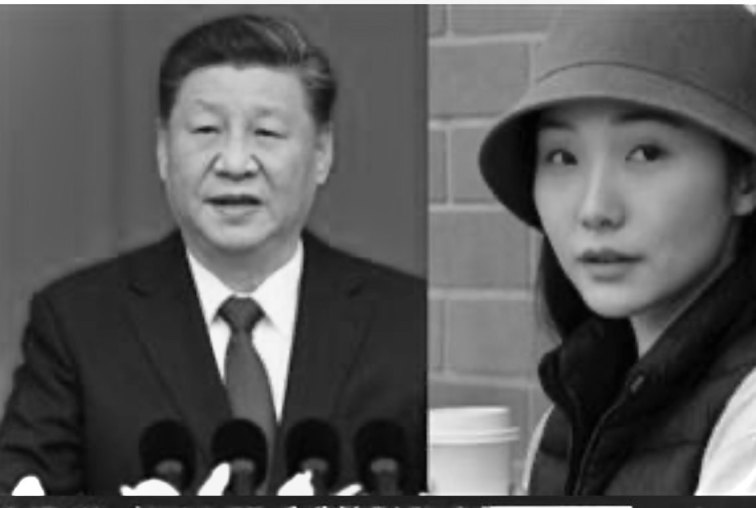Chinese leader Xi Jinping recently attended the APEC Summit, where, during the leaders' group photo session, he stood alone at the centre of the stage, with no one approaching him for conversation, appearing visibly desolate. (Video screenshot)
[People News] During the military parade in Beijing, when Xi Jinping remarked, "At 70, still a child," Putin responded by suggesting that organ transplantation could lead to longevity, to which Xi confidently asserted that humans could live up to 150 years. This exchange between Xi and Putin inevitably recalls the book "The Giant Baby Nation" by Chinese psychologist Wu Zhihong, published in 2016. This book was removed from shelves and banned just three months after its release. What exactly did it do to anger the Xi Jinping administration?
Senior media figure and current affairs commentator Chang Ping published an article on September 13 in Deutsche Welle, highlighting that large-scale military parades are one of the methods used by giant baby leaders to train giant baby citizens.
Chang Ping pointed out that Xi Jinping's comment, "At 70, still a child," reminded him of a psychological term: giant baby. This term describes adults who are psychologically immature, overly dependent, self-centred, and lack a sense of responsibility.
He argues that Xi Jinping, Putin, and Kim Jong-un represent political "giant babies": "They are still living in their childhood or even earlier—Xi Jinping eagerly embraces Mao Zedong's 'philosophy of struggle,' Putin dreams of restoring the Soviet Empire's territory, and Kim Jong-un naturally perpetuates the ancient 'hereditary system.'
Chang Ping referenced Wu Zhihong's work, "The Giant Baby Nation," published in 2016.
In December 2016, "The Giant Baby Nation" was released and quickly garnered significant attention, receiving strong endorsements from prominent figures such as Chinese media personality Luo Zhenyu and writer Zhang Defen. At that time, the well-known video program "Luo Ji Si Wei" dedicated an entire episode to discussing this book.
On February 17, 2017, just three months after its release, Beijing Motie Publishing Co., Ltd. (the publisher) issued a "Notice of Recall" to relevant distribution units, stating that "The Giant Baby Nation" was being recalled due to quality issues.
Shortly after the book was pulled from shelves, observant readers noticed that the 198th episode of "Luo Ji Si Wei," which had specifically introduced this book, had vanished and could not be found online. Clearly, this was not merely a matter of "quality."
The central thesis of "The Giant Baby Nation" is that 90% of our love and pain is tied to a fundamental truth: most adults are psychologically infants.
Wu Zhihong, the author, has stated that he contemplated writing "The Giant Baby Nation" for 21 years and spent 5 years crafting it. He had a strong desire to understand the nature of the Chinese people, which he had nurtured since his sophomore year in college.
In an interview with "China Youth Daily," Wu Zhihong remarked, "There is a general consensus in the domestic psychoanalysis community that the collective psychological age of the Chinese people does not exceed one year. I have an even more radical assessment — it does not exceed six months. Such adults are giant babies; such a country is a giant baby nation."
The book "Giant Baby Nation" explores the national character without directly addressing politics. So why is it banned?
Chang Ping suggests that perhaps the leader, who is "70 years old yet still a child," along with his "giant baby" ministers, believes that the Chinese people, under the guidance of a great leader, can only be a hardworking, brave, and wise nation. How could they possibly be seen as giant babies? Even if they are, such thoughts are not permitted.
What fosters this giant baby mentality among the populace? Wu Zhihong argues that collectivism serves as the breeding ground for such traits.
In his book, he states: "The essence of collectivism is that the psychological development of individuals is too underdeveloped, resulting in a fragmented inner self for most people. They must conform to a uniform standard, seeking to merge with others in a symbiotic way, thereby embedding individuals into a collective identity."
Some scholars have noted that if we broaden our view from the family unit to society, there were certain historical periods when China's collectivist culture thrived. During those times, interpersonal relationships were largely symbiotic. According to the norms of those eras, any action taken had to prioritise collective interests, and any personal thoughts had to align with the majority's views, as individuals were not seen as independent entities; thus, the concept of independent thinking was virtually nonexistent.
Wu Zhihong recounts a story from the renowned writer Wang Xiaobo: When a flood struck, a young man drowned while attempting to save a collective electric pole. Following this incident, a vigorous debate ensued about whether the young man's actions were justified. Ultimately, the authorities concluded that whether it was an electric pole or even a single straw belonging to the collective, it was worth saving in such a manner.
Chang Ping highlighted that sending soldiers to Tiananmen Square for a marching performance is a blatant and grotesque display of collective behaviour aimed at training citizens into colossal infants, wasting both manpower and resources.
In his book, Wu Zhihong remarked, "The Emperor's Dream, the Totalitarian Dream, are all Colossal Infant Dreams." Many readers at the time noted that this was the statement they most identified with in the book.
Wu Zhihong argues that the reason why insightful loyal ministers throughout Chinese history often lose to eunuchs is that eunuchs willingly serve as absolute executors of the emperor's commands. Given that most monarchs are "colossal infants," what they crave most is a eunuch who can be easily manipulated—only the kind of unrestrained flattery and obedience from eunuchs can make the emperor feel all-powerful.
Some readers have commented on the book "Colossal Infant Nation," stating, "I believe this is my favourite book of 2016. Reading a book filled with truth really makes one sweat and feel chills down their spine..."
As early as the initial phase of the 19th National Congress of the Communist Party of China, rumours circulated in 2016 that Xi Jinping would seek re-election after the 20th National Congress by amending the constitution.
The Hong Kong media outlet "Frontline" reported in its November 2016 issue that a genuine "liberal Xi supporter" had leaked a secret from a small circle, revealing Xi Jinping's four "five-year plans."
In November 2016, another article by "Yang Zi" titled "Steps for Xi Jinping to Achieve a Third Term" gained significant traction online. The article noted that the newly established "Xi Core" could not serve for just five years, but rather at least ten, and outlined that Xi Jinping would take three steps to fulfil his ambition of dominating the Chinese Communist Party's political landscape for 30 years.
The timing of the publication and subsequent removal of 'The Giant Baby Nation' is noteworthy. The book's phrases, such as 'the emperor's dream, the totalitarian dream, are all giant baby dreams,' not only foresaw the secret ambitions of the 'one supreme leader' to become an emperor but also served to enlighten the public. Considering Xi Jinping's character, it is understandable that he would be enraged, making the book's removal an inevitable outcome. △











News magazine bootstrap themes!
I like this themes, fast loading and look profesional
Thank you Carlos!
You're welcome!
Please support me with give positive rating!
Yes Sure!